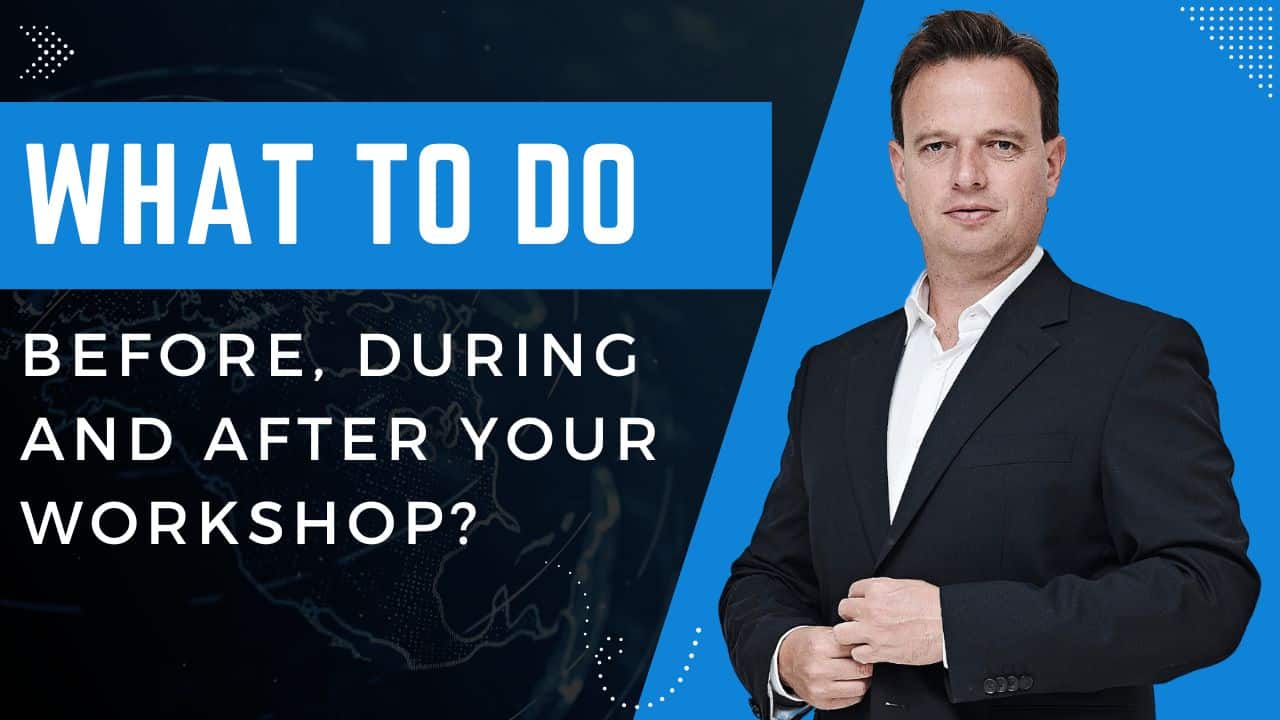Today, I want to show you a simple process for consistently achieving successful workshop results.
It’s my Before, During and After Workshop Checklist, and it applies to any workshop in any situation.
This checklist lays out the important things you need to cover to demonstrate to all concerned that you’re a professional and in full control.
Even if you feel a little out of your depth inside
Why what you do before, during and after the workshop matters
You’d be forgiven for thinking a successful workshop is about which tools or processes you use.
While that’s part of it, the last 20 years have shown me that success hinges more on what you do before, during, and after the session than on the tools you use in the session itself.
I’m always surprised by how many workshop facilitators don’t spend time getting properly prepared for their sessions.
How can you demonstrate authority and control if you’re not doing that?
For example, let’s say you’re running a session offsite. When you get there in the morning, you realise the electricity plugs are in the wrong location, the venue doesn’t have a projector that works with your computer, and there is no way for you to connect to the sound system.
What do you think your participants think while they watch you run around hurriedly creating a Plan B on the fly?
If you’re not answering these questions for yourself well in advance - you’re letting the environment around you dictate your actions.
And being dictated to by missing equipment is not how great workshops are run.
That’s why this Before, During and After Workshop Checklist is so powerful.
Here's how it works.
Before
- Talk through the design outline with the sponsor to get their agreement.
- Discuss the content of the sponsor’s introduction.
- Agree on whether an agenda needs to be sent out in advance (high level only).
- Prepare all of your materials, handouts, and logistical requirements.
- Visit the venue if possible and spend some time in the room you’ll be working in to get a feel for it.
- Load the slides on your computer and on a memory stick as a backup.
- Have supplies of marker pens, post-it notes, white-tack, sellotape, brown paper, and scissors.
- Pack an electricity extension cable and plug board (power strip in the USA) in case the sockets are in the wrong place.
- Pack your projector if required (use the venue’s if possible).
- Print copies of your event design as your reference point throughout the event.
Before (what you participants need to know)
- What is the purpose of the workshop?
- Who is the sponsor?
- Who else is attending?
- What prior knowledge, reading, or other preparation do they need?
- Are there any submissions, data, etc., they need to provide or bring with them?
- All the logistical information they need to ensure they get there.
- They don’t need to know exactly what processes or tools you’ll be using with them.
During
Do
- Make sure you’re early. It looks terrible if you arrive late.
- Arrange the room - it is the stage for your performance.
- Check that your equipment works and that all your materials are there.
- Run through your slides on the screen and watch from the back of the room.
- Meet the venue manager to confirm everything.
- Find the toilets, planned fire alarms, etc.
- Relax and get comfortable.
- If it is a multiple-day event, be there early EVERY day.
- Watch your timings.
- Create ground rules at the start, but ensure they come from them, not you.
- Use a “Parking Lot” for questions that emerge that either can’t be answered or are off-topic.
- Stay in touch with the key players throughout the day.
- Always know what is coming up next.
- Constantly assess the energy in the room.
Don’t
- Don’t ever totally relax except when you are on your own.
- Don’t drink alcohol (even in the evening).
After
- Review your workshop (with the sponsor or key stakeholders). Ask them, “What Went Well?” and “What would have made it even better?”
In Conclusion
Using this checklist, I produce high-quality workshops that consistently meet my sponsors' and participants' objectives and exceed their expectations.
At every stage, I demonstrate that I know what I’m doing, and nothing surprises me.
So, if something unexpected or unusual does crop up, as it often does, my participants already have confidence I will steer them to a successful conclusion.
Use this checklist and adapt it to your workshop's specific context and goals.
Doing so results in a successful and impactful learning experience for participants.
That’s it for today.
I hope you enjoyed it.

